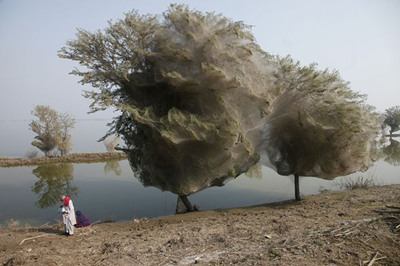(单词翻译:单击)
The giant spider webs in Sindh, Pakistan, sometimes stretched from tree to tree, as seen above in December 2010.
"Any kind of vegetation that was above ground was affected, literally every kind of tree and bush," Watkins said of the widespread spider webs.
While unusual, trees cocooned in spider webs are not unprecedented. Scientists have reported similar webs in other parts of the world, the tropics in particular. In 2007, for instance, a superintendent at Lake Tawokoni State Park in Texas discovered a giant spider web among the trees.
Watkins said he didn't know which type of spider was responsible for the tree cocoons in Sindh. But in the case of Lake Tawokoni, scientists determined that dozens of spider species were spinning the communal webs.
2010年12月,在巴基斯坦的信德省,出现了缠绕于树与树之间的巨大蜘蛛网。
对于在当地泛滥的蜘蛛网,Watkins说到,“任何长在地面上的植被都被波及了,几乎包括每一种树木和灌木”。
虽然不常见,但被缚成“茧”的树却并不是第一次出现了。之前在热带地区,科学家们就已经过观察到类似的网了。比如2007年,在德克萨斯州的Lake Tawokoni州立公园也发现了树木间巨大的蜘蛛网。
Watkins说,他并不清楚到底是哪一种蜘蛛在信德省织出了困住树木的网。不过在Lake Tawokoni,研究人员发现数十种蜘蛛都在为这项浩大的工程贡献自己的力量。



